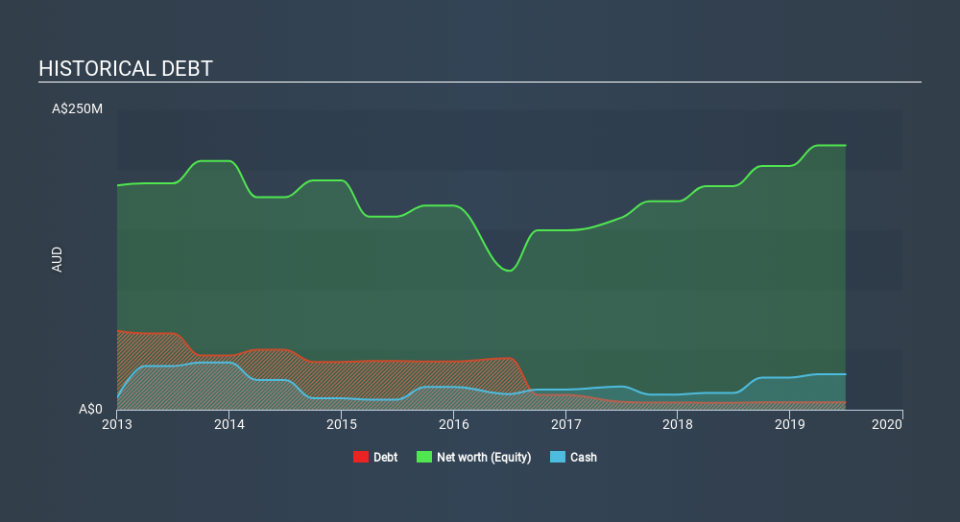We Think Imdex (ASX:IMD) Can Manage Its Debt With Ease

Some say volatility, rather than debt, is the best way to think about risk as an investor, but Warren Buffett famously said that 'Volatility is far from synonymous with risk. So it might be obvious that you need to consider debt, when you think about how risky any given stock is, because too much debt can sink a company. Importantly, Imdex Limited (ASX:IMD) does carry debt. But the real question is whether this debt is making the company risky.
What Risk Does Debt Bring?
Debt assists a business until the business has trouble paying it off, either with new capital or with free cash flow. In the worst case scenario, a company can go bankrupt if it cannot pay its creditors. While that is not too common, we often do see indebted companies permanently diluting shareholders because lenders force them to raise capital at a distressed price. Of course, the upside of debt is that it often represents cheap capital, especially when it replaces dilution in a company with the ability to reinvest at high rates of return. When we examine debt levels, we first consider both cash and debt levels, together.
Check out our latest analysis for Imdex
What Is Imdex's Net Debt?
As you can see below, Imdex had AU$6.11m of debt, at June 2019, which is about the same the year before. You can click the chart for greater detail. But on the other hand it also has AU$29.5m in cash, leading to a AU$23.4m net cash position.
How Strong Is Imdex's Balance Sheet?
Zooming in on the latest balance sheet data, we can see that Imdex had liabilities of AU$32.8m due within 12 months and liabilities of AU$6.37m due beyond that. On the other hand, it had cash of AU$29.5m and AU$55.7m worth of receivables due within a year. So it can boast AU$46.0m more liquid assets than total liabilities.
This surplus suggests that Imdex has a conservative balance sheet, and could probably eliminate its debt without much difficulty. Simply put, the fact that Imdex has more cash than debt is arguably a good indication that it can manage its debt safely.
In addition to that, we're happy to report that Imdex has boosted its EBIT by 30%, thus reducing the spectre of future debt repayments. The balance sheet is clearly the area to focus on when you are analysing debt. But ultimately the future profitability of the business will decide if Imdex can strengthen its balance sheet over time. So if you're focused on the future you can check out this free report showing analyst profit forecasts.
Finally, a company can only pay off debt with cold hard cash, not accounting profits. Imdex may have net cash on the balance sheet, but it is still interesting to look at how well the business converts its earnings before interest and tax (EBIT) to free cash flow, because that will influence both its need for, and its capacity to manage debt. Looking at the most recent three years, Imdex recorded free cash flow of 30% of its EBIT, which is weaker than we'd expect. That's not great, when it comes to paying down debt.
Summing up
While it is always sensible to investigate a company's debt, in this case Imdex has AU$23.4m in net cash and a decent-looking balance sheet. And it impressed us with its EBIT growth of 30% over the last year. So is Imdex's debt a risk? It doesn't seem so to us. Another factor that would give us confidence in Imdex would be if insiders have been buying shares: if you're conscious of that signal too, you can find out instantly by clicking this link.
When all is said and done, sometimes its easier to focus on companies that don't even need debt. Readers can access a list of growth stocks with zero net debt 100% free, right now.
If you spot an error that warrants correction, please contact the editor at editorial-team@simplywallst.com. This article by Simply Wall St is general in nature. It does not constitute a recommendation to buy or sell any stock, and does not take account of your objectives, or your financial situation. Simply Wall St has no position in the stocks mentioned.
We aim to bring you long-term focused research analysis driven by fundamental data. Note that our analysis may not factor in the latest price-sensitive company announcements or qualitative material. Thank you for reading.

